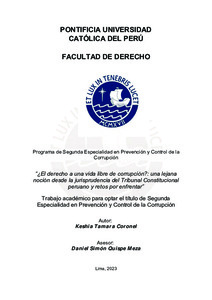| dc.contributor.advisor | Quispe Meza, Daniel Simón | |
| dc.contributor.author | Tamara Coronel, Keshia | |
| dc.date.accessioned | 2024-04-01T16:24:36Z | |
| dc.date.available | 2024-04-01T16:24:36Z | |
| dc.date.created | 2023 | |
| dc.date.issued | 2024-04-01 | |
| dc.identifier.uri | http://hdl.handle.net/20.500.12404/27462 | |
| dc.description.abstract | El presente articulo académico tiene como finalidad exponer los posibles
problemas teóricos y prácticos que enfrentaría nuestro sistema jurídico ante un
posible reconocimiento de personas naturales o un grupo de ellas, como víctimas
o agraviados de hechos ilícitos de corrupción.
El panorama no resulta lejano, ya que, si bien nuestro país se encuentra lejos de
reconocer un posible derecho a una vida, sociedad o gobierno libre de
corrupción, las tendencias internacionales apuntan cada vez más a reconocer la
relación entre las consecuencias de actos corruptos con la afectación a derechos
humanos.
En ese sentido, concluiremos que, como se encuentra planteado nuestro sistema
jurídico, resulta dificultoso armonizar los principios y derechos del proceso penal
que resguardan a las partes. No obstante, de contar con una iniciativa legislativa
que tome en cuenta los problemas teóricos y prácticos a presentarse, no resulta
tan distante la idea de poder reparar directamente a las personas o pueblos que
han sido afectados por actos corruptos. | es_ES |
| dc.description.abstract | The purpose of this academic article is to present the possible theoretical and
practical problems that our legal system would face in the event of a possible
recognition of individuals or a group of individuals as victims or aggrieved parties
of unlawful acts of corruption.
Although our country is far from recognizing a possible right to a life, society or
government free of corruption, international trends increasingly point to the
recognition of the relationship between the consequences of corrupt acts and the
affectation of human rights.
In this sense, we will conclude that, as our legal system is set out, it is difficult to
harmonize the principles and rights of the criminal process that protect the
parties. However, if there is a legislative initiative that takes into account the
theoretical and practical problems to be presented, the idea of being able to make
direct reparations to individuals or peoples who have been affected by corrupt
acts is not so distant. | es_ES |
| dc.description.uri | Trabajo académico | es_ES |
| dc.language.iso | spa | es_ES |
| dc.publisher | Pontificia Universidad Católica del Perú | es_ES |
| dc.rights | info:eu-repo/semantics/closedAccess | es_ES |
| dc.subject | Derecho procesal penal--Perú | es_ES |
| dc.subject | Corrupción--Perú | es_ES |
| dc.subject | Delitos de los funcionarios--Perú | es_ES |
| dc.subject | Resarcimiento (Justicia penal)--Perú | es_ES |
| dc.title | ¿El derecho a una vida libre de corrupción?: una lejana noción desde la jurisprudencia del Tribunal Constitucional peruano y retos por enfrentar | es_ES |
| dc.type | info:eu-repo/semantics/bachelorThesis | es_ES |
| thesis.degree.name | Segunda Especialidad en Prevención y Control de la Corrupción | es_ES |
| thesis.degree.level | Título Profesional | es_ES |
| thesis.degree.grantor | Pontificia Universidad Católica del Perú. Facultad de Derecho | es_ES |
| thesis.degree.discipline | Prevención y Control de la Corrupción | es_ES |
| renati.advisor.dni | 70437387 | |
| renati.advisor.orcid | https://orcid.org/0000-0002-5979-4744 | es_ES |
| renati.author.dni | 76271395 | |
| renati.discipline | 421249 | es_ES |
| renati.level | https://purl.org/pe-repo/renati/level#tituloSegundaEspecialidad | es_ES |
| renati.type | https://purl.org/pe-repo/renati/type#trabajoAcademico | es_ES |
| dc.publisher.country | PE | es_ES |
| dc.subject.ocde | https://purl.org/pe-repo/ocde/ford#5.05.02 | es_ES |






